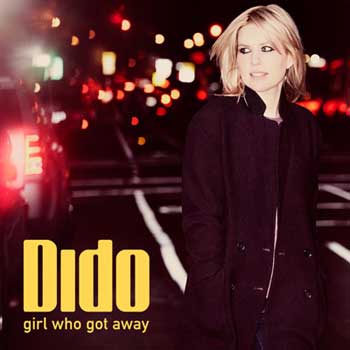 Girl who got away – Dido (Sony Music) Rs. 499/-
Girl who got away – Dido (Sony Music) Rs. 499/-
Dido has always penned her feelings in her songs, be it in her debut ‘No Angel’ (1999), ‘Life for Rent ‘(2003) and ‘Safe trip Home’ (2009). Her latest work is no different. The Great Britain native Florian Cloud de Bounevialle O'Malley Armstrong which is Dido’s real name, is a name of a warrior queen returns after almost four years, a regular four year gap she has been keeping with, with a sound similar to her earlier effort.
Working once again with her brother Rollo Armstrong, who has produced the majority of the album, Dido also collaborated with a few hit makers including Brian Eno, Jeff Bhasker, Rick Nowels and Greg Kurstin to bring forth a self penned, soul-baring pop album with shades of electro, folk, influences. Everyone who has followed this pop diva closely will vouch for her beautiful voice, memorable and imitable. Her soft vocals may not be very powerful, but they are very pleasant at the first listen played with soft guitars and drums that emphasize the singer’s vocals. Instrumentally, you find just low playing acoustic guitars, light drum beats, a bit of electronic, all backed with the string section coming in at right intervals. You won’t find a very heavy sound anywhere on the album, as most tracks are slow.
Take on pieces like the opener the catchy No Freedom (a close tune to Bob Marley’s No Woman, No Cry), to a guest spot featuring Kendrick Lamar the alt-crossover rapper du jour of 2013 on Let us move on and a classic sad piano setting for a broken heart. Dido has not changed her style, though this track might just show a slight deviation from her bluesy night sound. End of the Night though slightly eerie has beautiful lyrics that go…. I can smile now, And turn away, Come over here, So you can see me walk away, And celebrate, The end of night….. and a is pretty fun song. Other favorites include Blackbird, Just Say Yes, Let's Runaway, Go Dreaming, and Loveless Hearts. Sitting on the Rooftop of the World is brilliant, just Dido’s vocals and slight instrumentation, while the beat gets heavy with a slightly disco effect on Love to Blame. The last track Day before we went to war is devoid of heavy score and instead highlights Dido’s voice.
This album of 11 songs may not have many takers if you are looking for music with a lot of drive. But it’s Dido’s creamy alto that is both musically and lyrically interesting, that keeps the music flowing, eerie at times backed by drum beats that seem a trifle tribal. Dido is surely not looking at filling the newspapers with her work; though the music might be depressing, she wishes to connect with music lovers who love her songwriting and vocal ability.
Includes lyrics.
Rating: ****
-- Reviewed by Verus Ferreira
